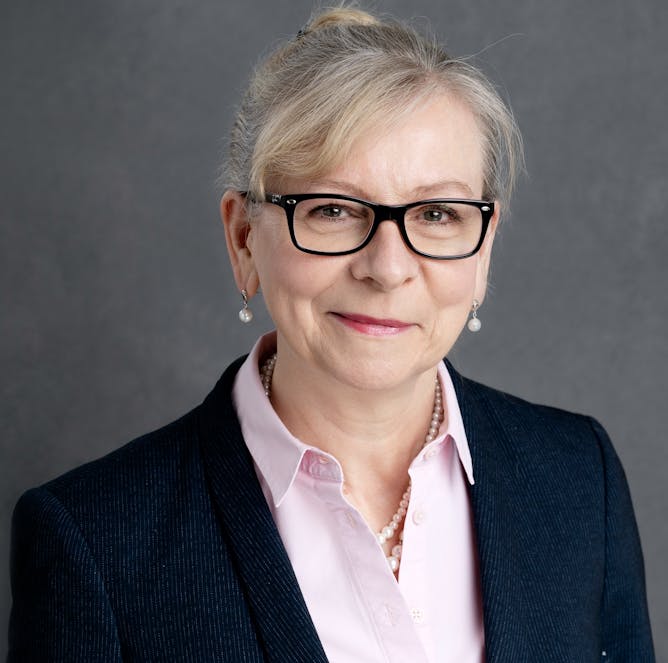|
|
|
|
When a new, more transmissible variant of the coronavirus SARS-CoV-2 emerged in the UK in November last year, many people appeared to be caught off guard. But not Sharon Peacock, professor of public health and microbiology at the University of Cambridge, who had been concerned about the danger that mutations in the virus could pose since the early days of the pandemic.
That’s why, in March 2020, she set up the COVID-19 Genomics UK Consortium (Cog-UK), which has since been responsible for nearly half of all coronavirus genome sequencing in the world. This genuinely word-leading capability is what enabled the UK to identify the new variant in November, and to spot and try to isolate further worrying mutations more recently.
After taking part in one of our recent webinars, Prof Peacock spoke to The Conversation about how she set up Cog-UK, and what she’s learnt since – including which variants are most worrying, and why mutations might make delivering future booster vaccines harder than dealing with flu.
Elsewhere, we’ve been hearing why Elon Musk’s decision to have Tesla purchase $1.5 billion of bitcoin could start a trend with the potential to derail the stock market. And why the pandemic means you
should keep your windows open – even though it’s freezing outside.
Plus, we’ve been listening to the latest episode of our fantastic new podcast, The Conversation Weekly, which this weeks unpacks why the people of Myanmar are rising up after decades of military rule, and why researchers are testing wild animals for COVID-19.
|
Clint Witchalls
Health + Medicine Editor (UK edition)
|

|
|

Sharon Peacock
Sharon Peacock, University of Cambridge
How the UK came to be the world leader in sequencing SARS-CoV-2, in the words of the person who made it all happen.
|

Simon Brat/Shutterstock
Ian Colbeck, University of Essex
Ventilation is one of the most important methods of preventing the spread of infectious disease, a fact we've known for centuries.
|

‘It’s a one-way bet.’
EPA
Gavin Brown, University of Liverpool
There could be a reckoning coming with global regulators.
|

Protests have rocked Yangon in Myanmar in the wake of a military coup on February 1.
Nyein Chan Naing/EPA
Gemma Ware, The Conversation; Daniel Merino, The Conversation
Plus we talk to an American virologist testing wild animals for COVID-19. Listen to episode 2 of The Conversation Weekly podcast.
|
Health + Medicine
|
-
Mike Tipton, University of Portsmouth; Igor Mekjavic, Simon Fraser University
Skin temperature isn't a reliable measure of whether someone has a fever – scans should instead focus on other parts of the body.
-
Dominic Wilkinson, University of Oxford; Jonathan Pugh, University of Oxford
From February 15, people travelling to the UK from a country on the UK’s travel-ban list will be required to quarantine in a government-approved hotel for ten days.
-
Ciara McCabe, University of Reading
Research shows hobbies may lower levels of depression.
|
|
Politics + Society
|
-
Remi Adekoya, University of York
The most ignored and least understood UK demographic, mixed-race people don't want to be told who they are or where they fit in.
-
Tom Theuns, Leiden University; Andrei Poama, Leiden University
Everyone would benefit if people in prison were required to take part in elections rather than being banned, as is so often the case.
-
Michelle Bentley, Royal Holloway
A decade ago, the lack of a clear policy by the Obama administration let the region down. But might US have another opportunity in the Middle East?
|
|
Environment + Energy
|
-
Neil McCulloch, Institute of Development Studies; Radek Stefanski, University of St Andrews
The costs that fossil fuels impose on public health through air pollution alone are enormous.
-
Zhengyao Lu, Lund University; Benjamin Smith, Western Sydney University
In a bid to ditch fossil fuels, some countries are considering carpeting deserts with solar panels.
|
|
Science + Technology
|
-
Kelly Jakubowski, Durham University
Memories are closely linked with music.
-
Jessica Borge, School of Advanced Study
This is the story of Lucian Landau, the forgotten man who invented the technology that made Durex boom.
|
|
| |
Featured events
|

|
Whiteknights, Reading, West Berkshire, RG62UR, United Kingdom of Great Britain and Northern Ireland — University of Reading
|

|
Online, Online, Oxfordshire, N/A, United Kingdom of Great Britain and Northern Ireland — University of Oxford
|

|
East Road, Cambridge, Cambridgeshire, CB11PT, United Kingdom of Great Britain and Northern Ireland — Anglia Ruskin University
|

|
Online, Birmingham, Warwickshire, b15 2tt, United Kingdom of Great Britain and Northern Ireland — University of Birmingham
|
|
|
|
| |
| |
| |
| |
| |
|
|
|
|
|
|
|